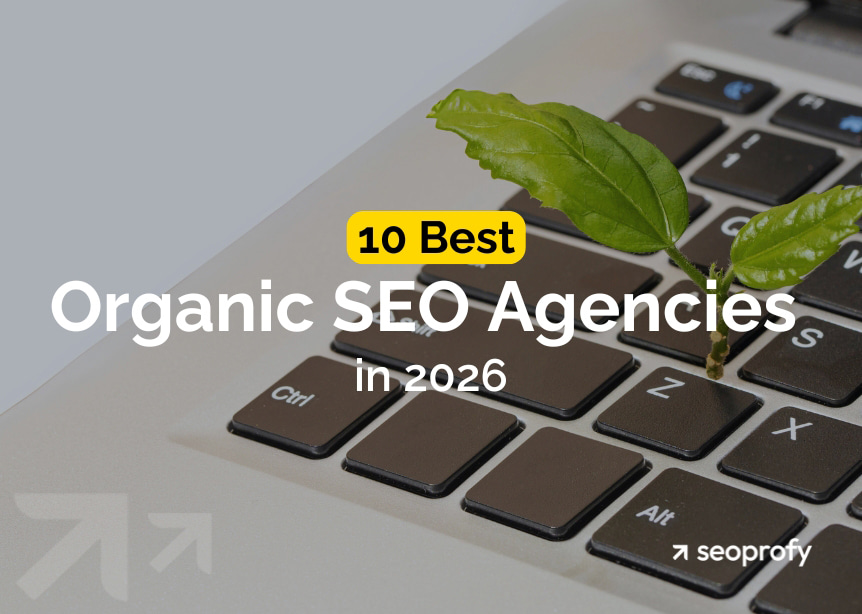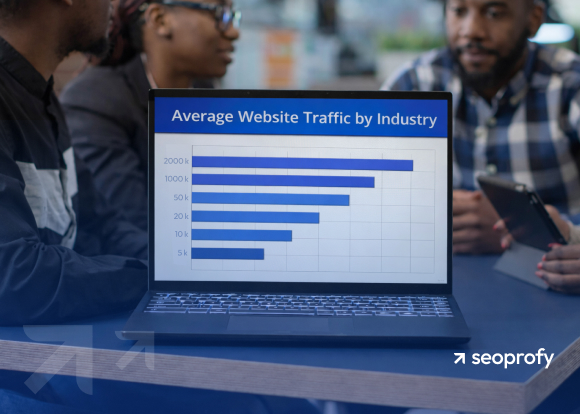B2B eCommerce SEO is the strategy that makes your online store visible to real buyers — decision-makers who are actively searching for solutions like yours. Unlike traditional SEO, it’s built for long sales cycles, complex products, and the high-stakes world of business-to-business commerce.
Ranking on Google isn’t just a vanity metric — it decides whether buyers ever find you. Only 9% of users scroll to the bottom of page one, leaving brands outside the top results invisible to over 90% of potential clients. In B2B, where each lead can mean thousands or even millions in revenue, that’s a costly risk.
SEO for B2B solves this by focusing on target keywords, trust-building content, and a seamless site experience customized to long, research-heavy buying cycles. This guide reveals how it differs from traditional SEO strategies that help your brand win high-value search results.
- An average B2B company spends from $2,500 to $7,500 on SEO per month.
- Buyers in B2B ecommerce go through a longer buying process, and purchase decisions are often made by several people.
- Creation of informational content is essential for pleasing B2B buyers at the beginning of their customer journey.
- Big ecommerce websites with thousands of product pages require properly adjusted robots.txt and XML sitemaps to stay crawlable and get noticed by search algorithms.
What Is B2B eCommerce SEO?
B2B search engine optimization (SEO) focuses on the improvement of a company’s website to make it rank higher in search engine results pages (SERPs) for target keywords. Eventually, it leads to an increase in site visits and sales of your products or services.
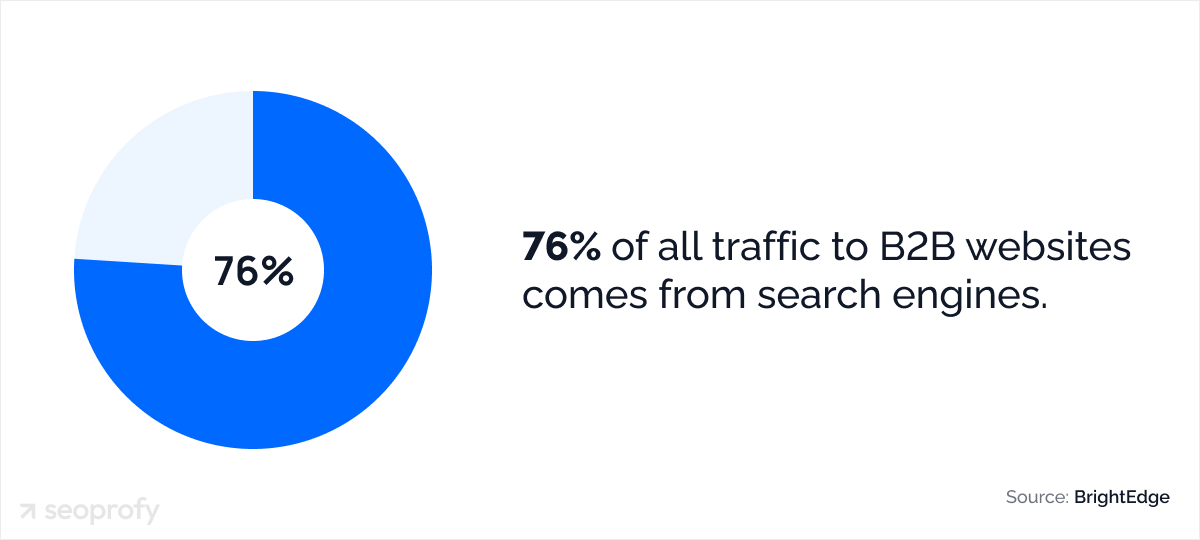
76% of all traffic to B2B websites comes from search engines like Google. So, if your website doesn’t perform well, you overlook a chance to reach dozens of prospective clients every month. Also, the development and implementation of an efficient B2B ecommerce SEO strategy can significantly support your business, as its primary targets include:
- Ranking for industry-specific keywords: Unlike usual customers, B2B clients opt for more complex search queries. It means that if you want to reach them, focusing on broad, high-volume keywords will help you succeed. Thus, B2B SEO involves the implementation of industry-specific, long-tail terms to make your web pages more relevant, leading to higher rankings in SERPs.
- Attraction of business buyers: B2B consumers have long and complex buying cycles, and you should ensure that proper content reaches them at the right time. B2B SEO helps you dive deep into your prospective clients’ pain points and needs to ensure that they won’t simply see your web pages in SERPs but also visit them to find out more about the topic they’re interested in.
- Generation of high-quality leads: A proper SEO strategy involves a strategic implementation of CTAs, inner links, and a clear structure on your website. Thus, it significantly strengthens your chances of converting visitors into clients or, at least, gathering valuable contact information.
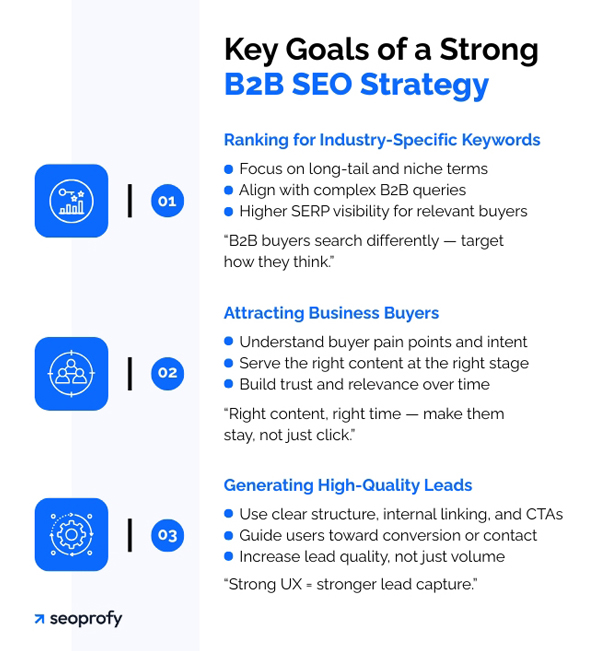
Why B2B eCommerce SEO Deserves Its Own Strategy
Effective B2B SEO requires crafting more informative content that provides technical details, highlights the company’s expertise, and addresses unique challenges. During its development, it’s also essential to consider important factors such as the latest ecommerce SEO trends and the specific business needs of your clients. And if you manage to properly conduct search engine optimization, your business will reap the following benefits:
- Lower advertising expenses: On average, a B2B company spends from $100 to $10,000 on paid advertising like Google Ads and LinkedIn, while expenses on SEO range from $2,500 to $7,500. Despite high numbers for both marketing channels, only search engine optimization ensures long-term results.
- Boosted brand awareness: With the help of high-quality content, you can make your company more visible and recognizable within your niche. Becoming an industry leader won’t simply boost your rankings, as your webpages will be more reputable in the “eyes” of search engines. It’ll also provide you with a flow of potential B2B customers who greatly appreciate working with reliable partners.
- Better customer experience: Considering the high competition in the B2B ecommerce market in any industry, it’s not enough to offer only valuable content and top-quality services. If you want to stand out from your opponents, it’s vital to run a mobile-friendly website with a clear structure and smooth navigation to simplify a complex buyer journey.
How B2B eCommerce SEO Differs from Traditional SEO
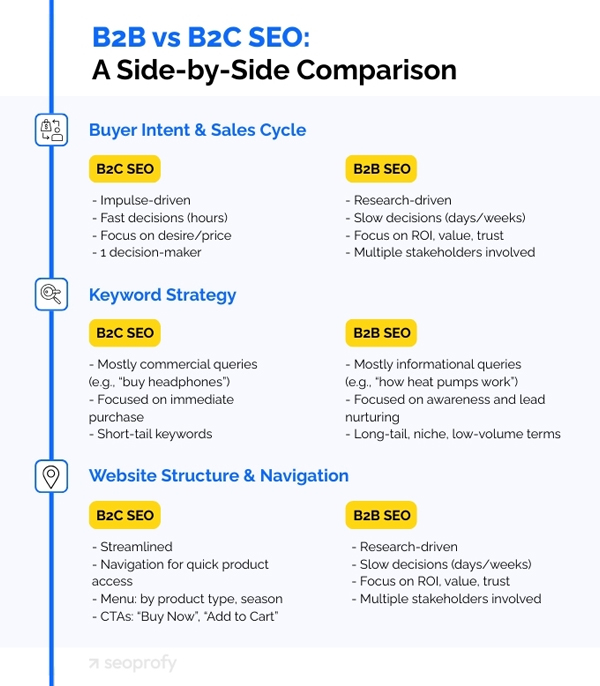
The distinct nature of target audiences, their buyer intents, and purchasing processes in B2C and B2B form the basis for the requirement of different approaches in search engine optimization. Let’s review these differences so you can better understand why you should consider them during your B2B ecommerce SEO campaign.
Longer Sales Cycles and Buyer Intent
B2C targets individual consumers and focuses on their urgent needs and desires. As a rule, these buyers need hours to decide which product or service they like the most and make a purchase.
However, when it comes to the purchasing process in B2B ecommerce, it often involves the approval of multiple people, holding key positions in the buyer’s company. The discussion of products or services often takes days and comprehensive research, leading to longer sales cycles.
Thus, effective B2B ecommerce SEO solutions have to build trust and lay the groundwork for partnership. It’s essential to give your prospective customer solid reasons for cooperation by showing how they can reach their goals with your products or services.
Keyword Strategy: Commercial vs. Informational Queries
In B2C ecommerce, target clients often opt for commercial searches, which include keywords like “purchase” or “buy.” For example, it may be “buy a gaming laptop” or “purchase a fridge online.” After comprehensive research, marketers can use these keywords to craft commercial content that ensures fast, emotion-driven purchases.
Talking about B2B ecommerce SEO, buyers start their journey with an informational (top-of-funnel) query. For example, it may include specific keywords like “How heat pumps work” or “How to install a heat pump.” These terms must be used for the creation of informational content that will attract early-stage buyers, build trust, and show your expertise.
At the same time, while developing your B2B SEO ecommerce strategy, it’s still essential to pay attention to commercial queries during the keyword research (e.g., “best heat pumps” or “heat pump manufacturers US”). You can use them to target the ready-to-buy clients and drive your conversions.
Website Structure and Navigation Differences
The improvement of the website structure is important in both B2C and B2B ecommerce SEO campaigns. However, it’s essential to understand the key differences between the sites of these two business models:
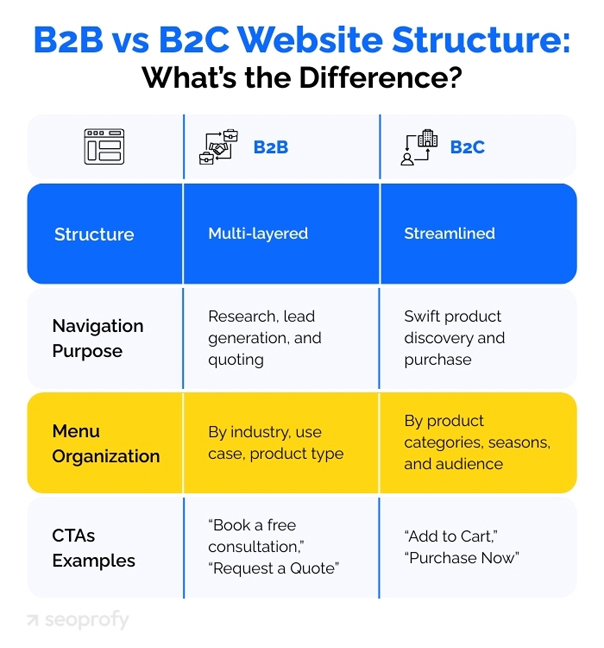
SEO Challenges Unique to B2B eCommerce Sites
Building an ecommerce website and ensuring its proper performance requires facing a variety of challenges. Some of them will depend on the specific audience and industry, while others are common for all stores operating in the B2B market:
- Poor product content: B2B product pages often lack SEO-friendly descriptions and use cases. Ignoring this problem leads to low keyword relevance, poor user engagement, and missed ranking opportunities.
- Duplicate pages: B2B sites often create URLs for each product or service variation instead of using canonical tags. It leads to the emergence of duplicate content, which affects the website’s authority and overall rankings.
- Small search volumes for niche terms: Specific keywords used by B2B buyers have low search volume, making it difficult to drive significant organic traffic.
With the help of B2B ecommerce SEO, you may identify all weak sides of your website. Realizing these issues is essential for choosing the right solutions for further search engine optimization.
Core Elements of SEO for B2B eCommerce
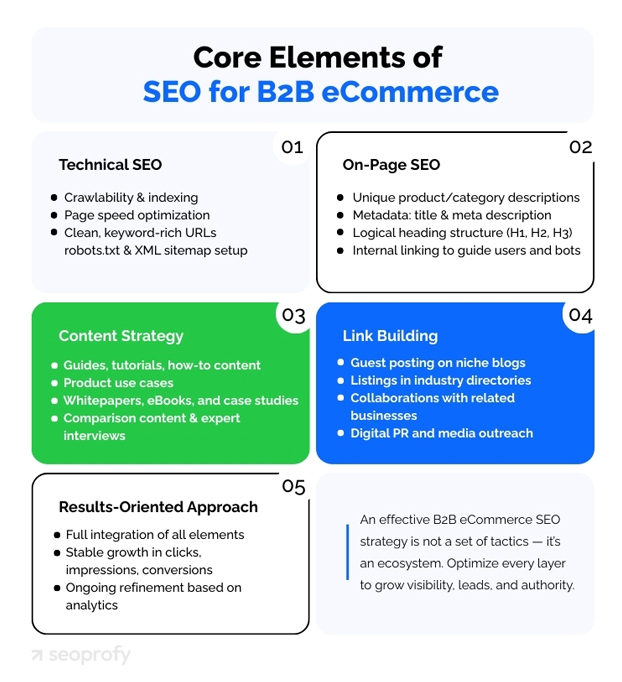
Efficient B2B ecommerce SEO isn’t only about researching keywords, writing content, enhancing the backlink profile, or improving the website’s site speed. This is a complex improvement of all aspects of the site to make it stand out from the competitors, boost organic traffic, enhance user experience, and increase conversions.
Our B2B ecommerce SEO case study proves how a proper combination of the mentioned processes can ensure a stable monthly growth, total clicks, and impressions:
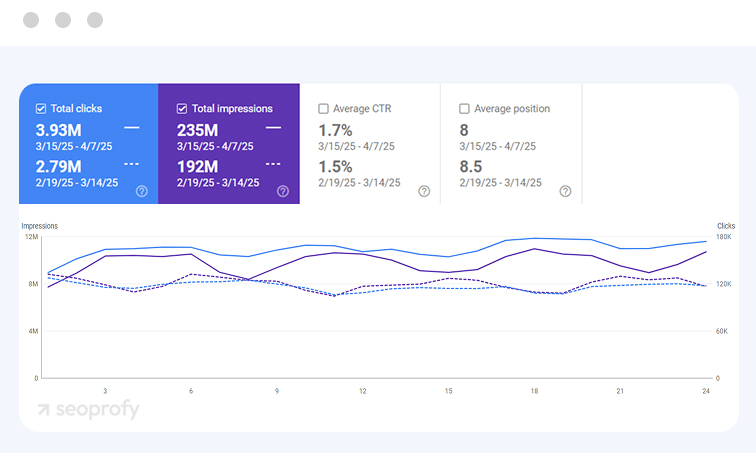
Do you want to reach similar results, but you aren’t ready to dive into a complex world of search engines and algorithms? Opt for our professional B2B SEO services to let our experts lead you to the top of the ecommerce market!
Technical SEO: Site Speed, Indexing, and Architecture
The technical background of your website is important for reaching high rankings and ensuring customer satisfaction. What is the reason for crafting top-quality content describing your products if it takes ages to upload a page containing it? Thus, it’s wise to start your B2B ecommerce SEO campaign by analyzing the following technical elements of your website:
- Crawlability: Search engines use crawlers to index web pages. In case your B2B website isn’t crawlable, your products or services won’t appear in SERPs. It’s essential to ensure the crawlability of the most important pages with the help of a clear site structure and sitemap optimization.
- Page speed: Fast websites have higher rankings, more conversions, and reduced bounce rates. You need to ensure that a buyer doing product research will get access to the desired information ASAP, regardless of the device they’re using.
- URL structure: It’s essential to keep URLs clean and human-readable if you want both users and search algorithms to understand the content on your pages. Often, B2B sites have messy URLs due to complex website structure, numerous filters, and faceted navigation. Instead of /category=1&id=4&filter=abc#section, opt for descriptive, keyword-rich address names such as /industrial-pumps/centrifugal.
- Robots.txt: This is a file that tells search algorithms which parts of your site should be crawled or ignored. Its proper usage allows for blocking low-value pages (e.g., filter combination) while ensuring that important sections are still crawlable.
- XML sitemap: It’s vital to use sitemaps to provide search algorithms with a roadmap of your website’s URLs to ensure the bots will discover them. This element is especially important for big B2B websites that contain catalogs with thousands of product pages.
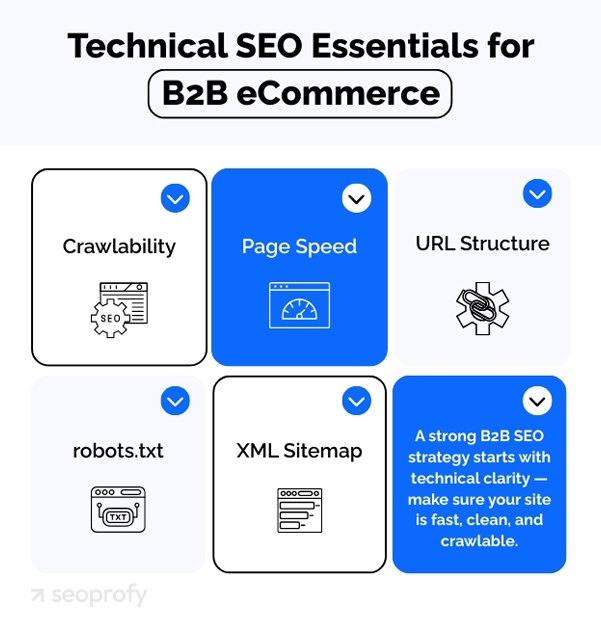
On-Page SEO: Product Pages, Category Pages, and Metadata
Perfectly optimized product and category pages are crucial for successful B2B eCommerce SEO. The first one attracts a wide audience via content that includes broad, high-volume keywords. Meanwhile, product pages target specific, high-intent searches. For a proper optimization of these website elements, focus on the following elements:
- Unique descriptions: Don’t copy-paste manufacturer texts for all your products and categories to avoid duplicate content. Ensure that all information on the pages is clear, highlights descriptions, and includes relevant keywords and technical specifications.
- Metadata: This data helps search engines understand the purpose of your web pages, which is essential for indexing and displaying relevant results in SERPs. Ensure that both title tags and meta descriptions include relevant keywords and clearly explain the topic, product, or service.
- Headings: SEO for B2B ecommerce often involves enhancing heading structure to ensure better readability and help search algorithms understand your content. Each page should include an H1 with the main product or category name, as well as H2s and H3s to organize information.
- Internal Links: With the help of internal links, you can ensure smooth navigation between category pages, subcategories, and featured products. Via strategic placement and descriptive anchors, you can guide your visitors through the numerous pages of your website, slowly converting them into ready-to-buy customers, improving on-page SEO for B2B ecommerce.
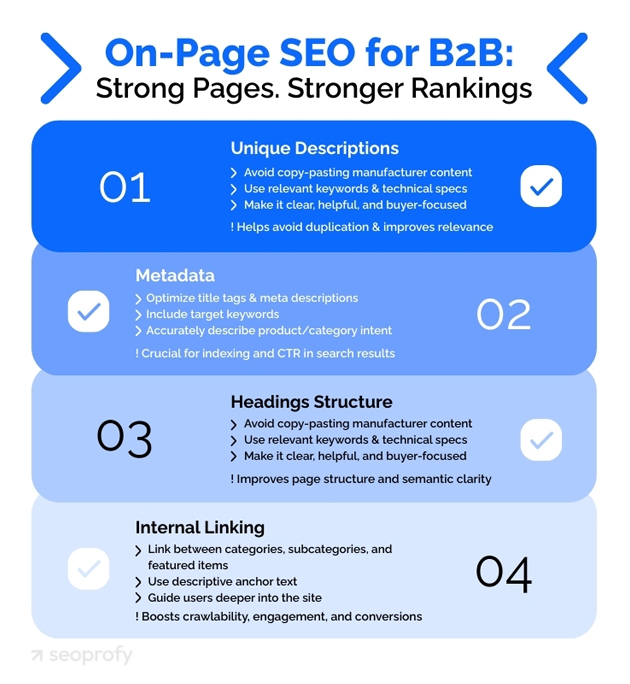
Content Strategy: Guides, Product Sheets, and Use Cases
Creating a proper content strategy is essential for overall B2B ecommerce SEO success. Via your blog posts and guides, you not only reach clients but also persuade them to opt for your products or services, highlighting their benefits. Although the choice of this or that type of content directly depends on your target audience’s preferences, marketers within B2B industries often opt for the following:
- Guides & tutorials: Help potential customers solve specific problems or learn how they can use your products.
- Product application articles: Show real-world cases that highlight the practical benefits of your solutions.
- Whitepapers & eBooks: Provide customers with in-depth insights and data, which is vital for building trustworthy relationships between them and your business.
- Case studies: Demonstrate proven results to help a buyer justify the purchase of your products or services.
- Comparison guides: Persuade decision-makers that your solutions are superior to alternatives.
- Expert interviews & webinars: Demonstrate your industry expertise.
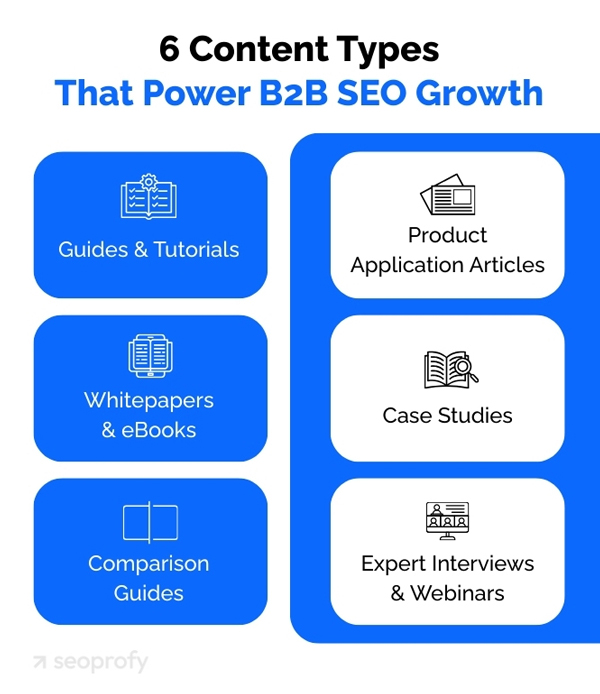
Link Building: Earning Authority in a Niche Industry
With dozens of link building strategies, it may be challenging to figure out which ones are the most effective to boost your B2B ecommerce SEO efforts. Considering that your target audience values trust and authority, it’ll be a good idea to focus on claiming the backlinks from reputable online sources related to your industry. Thus, we strongly recommend that you opt for the following techniques:
- Guest posts: Publishing articles and blog posts on other reputable websites related to your industry is one of the most effective ways to reach a wider audience, increase brand awareness, and gain valuable backlinks.
- Industry directories: Getting mentioned in the lists of businesses from your niche will make your company more visible within its sector.
- Collaborations: You can start working with other businesses and sites in your field to create content, share resources, and promote each other’s products and services. In this case, all participants of such a collaboration will get valuable mutual links and traffic.
- Digital PR: You can build and manage your brand’s reputation online by providing popular online newspapers and magazines with unique industry insights and studies. In this case, you don’t simply get top-quality backlinks, but also position your company as an industry expert.
Getting links from popular, high-quality domains makes your business more reputable for both prospective clients and search algorithms. Moreover, our B2B ecommerce SEO case study proves that the increase in quality backlinks can also lead to the growth of organic traffic:
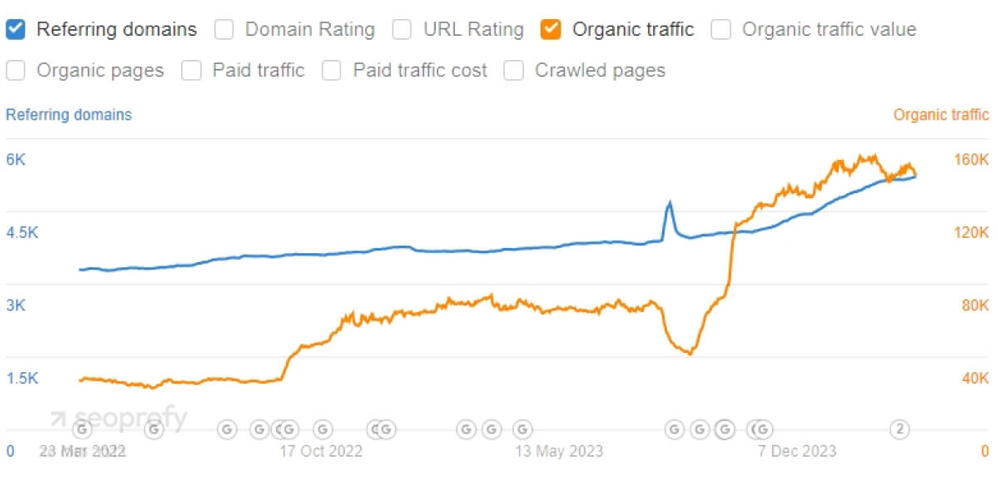
Building a B2B-Focused Keyword Strategy
A well-researched and strategically implemented keyword plan is the foundation of your successful B2B ecommerce SEO campaign. If you want to effectively identify keywords, follow these tips:
- Understand your audience: Identify your buyer roles (e.g., engineers) to discover who your clients are. Define their business needs, such as better ROI, scalability, and improved efficiency. Ask yourself what words they use to look for products or services you offer. Also, don’t forget to analyze your competitors to gain valuable insights.
- Collect keywords: Gather all discovered terms in a list. You can also expand it using tools like Ahrefs and Semrush. Organize them by relevance and search intent.
- Map keywords to funnel stages: Define the purposes of your keywords and strategically map them to different stages of the sales funnel. Use broad, educational terms to come up with ideas for top-of-funnel content (e.g., “How industrial heat pumps work”). Specific commercial keywords are usually used for the bottom-of-funnel stage (e.g., “buy industrial heat pumps US”).
For reaching successful B2B ecommerce SEO results, it’s also essential to use niche-specific language while searching for the keywords. Although the discovered terms will have lower search volume, they can help you focus on the audience that is indeed interested in your products or services.
Creating SEO-Optimized Content for B2B Buyers
A successful digital marketing strategy should involve the creation of unique content that includes proper keywords and a clear structure. Also, it should slowly move your customers through the sales funnel, inspiring them to make a purchase once they reach its bottom. And if you want your content to support your SEO efforts and truly stand out from your competitors, follow these simple pieces of advice:
- Solve problems: Provide information that focuses on the pain points of your target audience.
- Match search intent: Create proper content (e.g., how-to articles, guides, and comparisons) for different queries (navigational, informational, and transactional).
- Avoid pure promotion: In B2B ecommerce SEO, you can simply show your customer a product or service, expecting they’ll immediately buy it. Always offer value before inspiring them to make a purchase or discover more about your offers.
- Use visuals: Use charts, infographics, and videos to clarify complex topics and explain how your products work.
- Support your claims with data: The best way to highlight the efficiency of your products or services is to back your claims with real-life statistics or case studies.
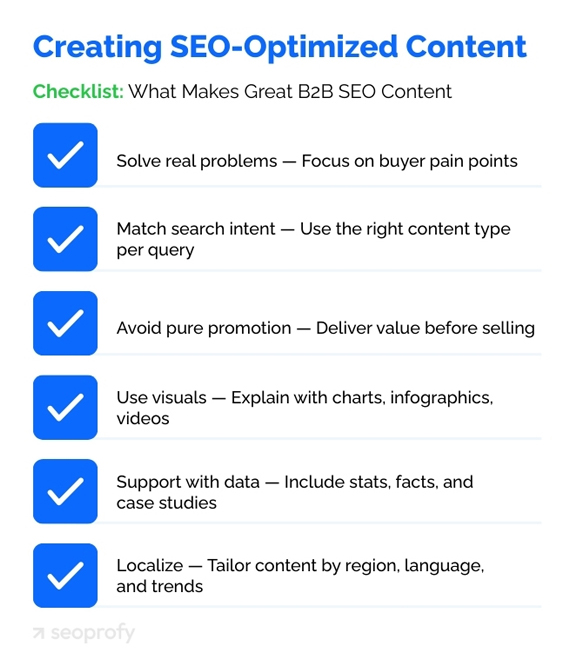
Also, if your company operates in several regions across the world, you need to tailor your content for the target audience in each specific area. It’s essential to consider the particularities of local slang and trends, skillfully combining them with the most efficient search engine optimization solutions. Our international SEO company is ready to help you with this challenging task, ensuring your business’s success in multiple countries.
SEO Tools for B2B Ecommerce
You’ll never develop and implement a proper B2B ecommerce SEO strategy without proper tools. Although there are a variety of different platforms, it’s better to opt for time-tested services for search engine optimization. Here, we’ve prepared a list of advanced SEO tools for B2B ecommerce, which you can use for keyword research, website performance monitoring, and technical audits:
- Ahrefs: Just like a Swiss knife in terms of SEO, this platform includes several tools for keyword research, backlink analysis, and competitor audit.
- Semrush: All-in-one service for B2B ecommerce SEO for uncovering high-value commercial keywords, content optimization, and competitive research.
- Screaming Frog: Software for the technical SEO audit and identification of issues such as broken links, duplicate content, and inappropriate metadata.
- SurferSEO: A content optimization tool that analyzes top-ranking pages and comes up with ideas for keywords, headings, and overall structure optimization.
- Google Search Console: A free tool for monitoring, maintaining, and troubleshooting your site’s search engine rankings in Google Search.
- Google Analytics: Another free service, which you can use to track and analyze website traffic and user behavior.
Common Mistakes in B2B eCommerce SEO
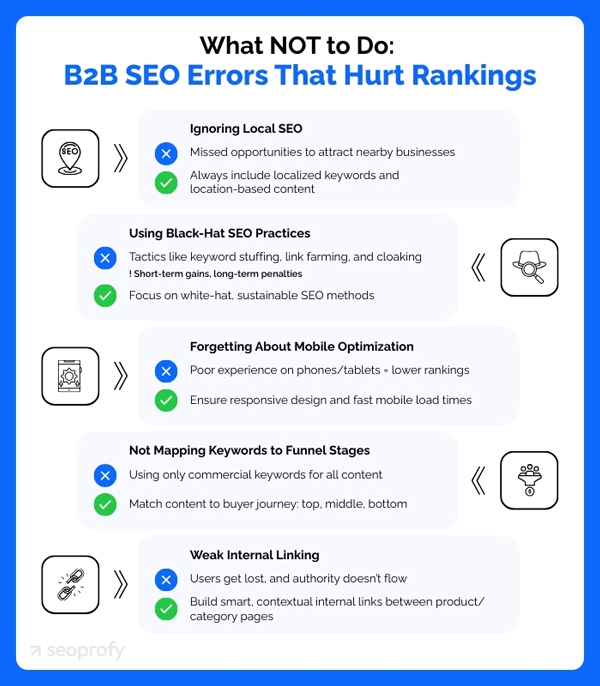
We’ve already discussed general mistakes made by website owners in our ecommerce SEO guide. Nonetheless, there are problems specific to B2B businesses. You need to consider them while developing and implementing your SEO strategy if you don’t want to ruin your efforts and reach your goals faster:
- Ignoring local SEO: You can miss opportunities to reach the target audience if you don’t include localized keywords in your content and product pages.
- Using black-hat practices: You can discover many services offering your swift B2B ecommerce SEO success. However, usually these companies use black-hat techniques such as keyword stuffing, link farming, and cloaking. Although you indeed may see positive results at first, soon such an approach will lead to Google’s penalties.
- Forgetting about mobile users: Google prioritizes mobile-friendly websites in search results. If you want your pages to rank high, you need to optimize them for all portable devices and OSs (Android and iOS).
Level up your B2B ecommerce SEO to overcome your competitors and reach prospective clients. SeoProfy will provide you with everything you need to achieve long-term success:
- Custom SEO strategies
- Regular reports
- Access to unique SEO tools

Choosing a B2B eCommerce SEO Service or Agency
The development and implementation of a B2B ecommerce SEO campaign is impossible if you don’t have proper experience and knowledge. Moreover, it may be inappropriate for you to pay for numerous tools and platforms for search engine optimization.
Thus, B2B ecommerce companies often seek SEO agencies to get professional assistance. To make the right choice, it’s important to pay attention to the following factors:
- Experience in the ecommerce industry.
- Case studies that prove the expertise.
- Transparent communication channels.
- Custom approach to the client’s needs instead of templated strategies.
Our ecommerce SEO company not only meets the highest industry standards but also knows the specifics of working with the B2B ecommerce industry from A to Z. We’ll come up with advanced solutions to adapt your existing content to your sales funnel, improve your backlink profile, and fix technical issues.
Final Thoughts on Conducting a B2B SEO eCommerce
A successful B2B ecommerce SEO strategy requires a lot of time, but the results it delivers are indeed worth it. Using tools like Screaming Frog, Search Analytics, or Semrush, you can identify technical issues, duplicate content, and other on-page weaknesses. Also, don’t forget to focus on identifying buyers’ roles and their business needs to discover target keywords and understand your client’s search intents.
When you collect all the mentioned information, you’ll be ready to improve existing content, update category and product pages, and enhance your website’s structure. You can also support your SEO efforts with link building techniques, but remember to avoid black-hat strategies.
And if you aren’t sure you can handle all the mentioned tasks on your own, you can always opt for a reliable B2B ecommerce SEO agency like SeoProfy. In this case, you and your team will be able to focus on important business processes, while our specialists will take care of your website, ensuring its stable growth.
FAQ
Why is content SEO so important for B2B eCommerce websites?
Content strategy is an integral part of B2B ecommerce SEO as it drives target traffic, establishes your brand’s authority, and boosts sales. Optimization of blog posts and product pages with relevant keywords and valuable information can significantly increase their rankings, ensuring the website’s stronger online presence and more visitors.
Which KPIs should you track to measure B2B eCommerce SEO success?
Key metrics for estimating B2B ecommerce SEO success are related to website performance, customer acquisition, and revenue. They include the following metrics:
- Organic traffic
- Conversion rates
- Keyword rankings
- Customer lifetime value
It’s essential to monitor the changes in these KPIs to ensure your strategy is efficient and doesn’t need any adjustments.
Why does B2B eCommerce need a dedicated SEO strategy?
A dedicated B2B ecommerce SEO strategy can help you increase visibility, boost qualified traffic, and grow sales. Considering that B2B buyers conduct extensive online research before making a purchase, it’s essential to develop a tailored ecommerce SEO approach that meets their search intents. Only in this case can you reach the right audience and increase conversion.










